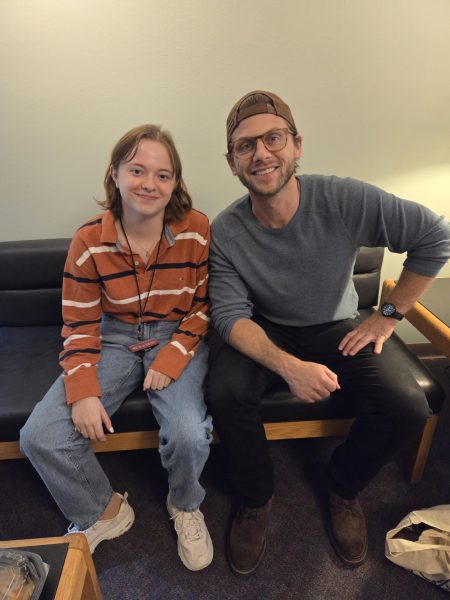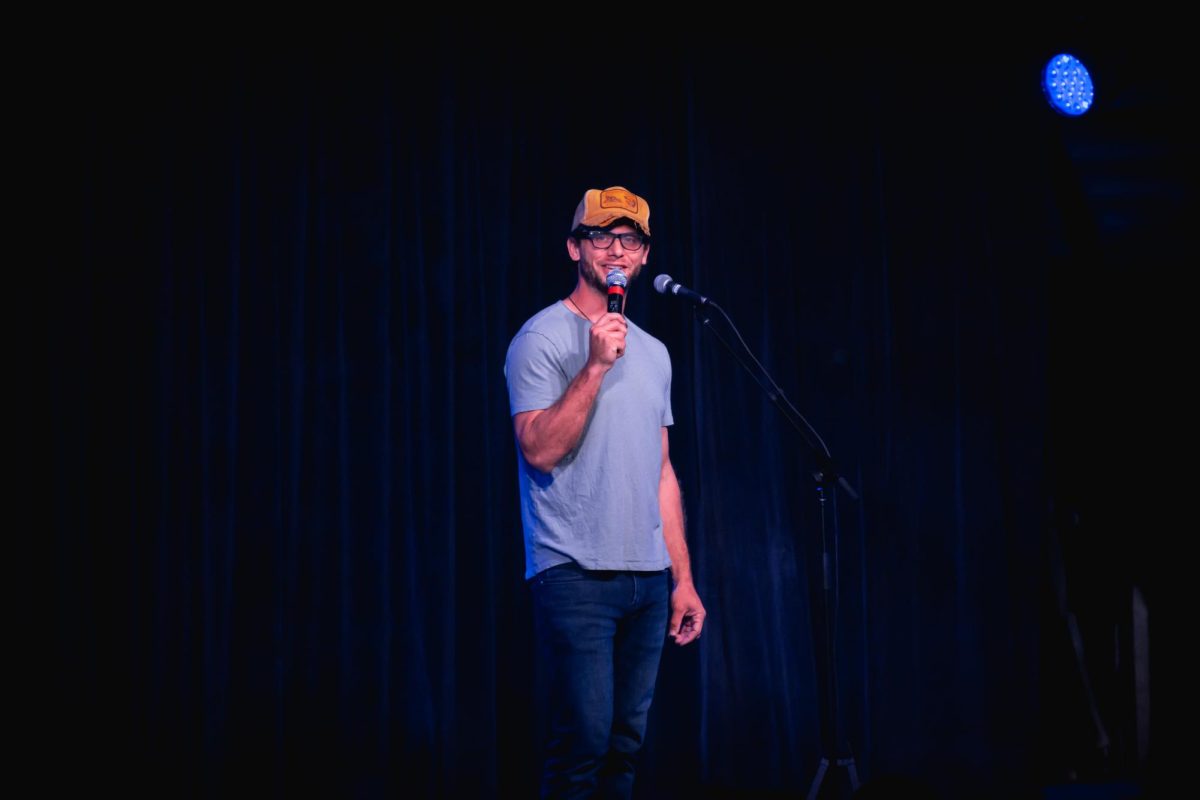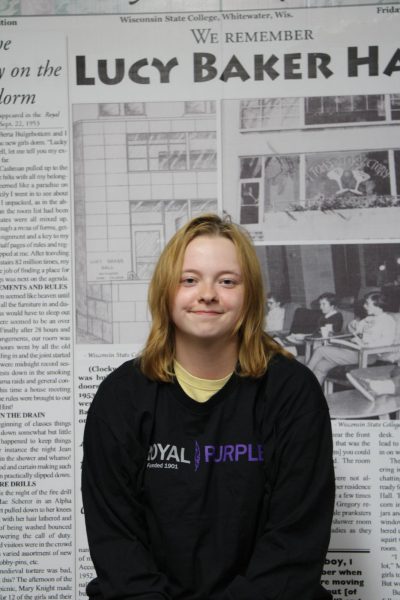When you think of Wisconsin comedians, one main person comes to mind, and that is Charlie Berens. After a long wait, the University of Wisconsin-Whitewater welcomed back the Midwest comedy legend Sept. 12. With only two chances to see him in one day, it was a tough battle for tickets as both shows ended up selling out The Young.
Before the Show
Before the performance began, people were being checked for bags, buying merchandise and even buying alcohol. But once attendees were seated, they were greeted to a setup on stage of a wooden stool placed in the center, accompanied by a microphone and stand with an ambiance of blue and purple stage lighting. That was not the only thing seen, as there was a projection of a slideshow that included some of Berens’ merchandise. One in particular caught many eyes, as his shirt with his saying “Watch For Deer” in white text on a black shirt was worn by Berens himself, with him wearing antler accessories. The other slideshows included his brandy recipe, his old-fashioned drink recipe, QR codes that linked to his podcast and other social media.
Ton Johnson
The lights faded in the audience as the slide show showed the word “OPE” in bar lights of red and blue, similar to the bar lights used in a bar setting. The announcement of Ton Johnson was heard, and the crowd went into a clapping frenzy. Johnson introduced himself to the audience, the key things that stood out to many were that he is a Warhawk alumnus from 2006-11. Coming back to the college city brought back memories for him.
“I went up to many of the current students and asked if certain spots were still around from my time, and they looked at me as though I was crazy,” Johnson said.
He went on to another topic about life on the road with Charlie Berens.
“I love being with Charlie; he is just a regular guy,” Johnson said.
But what made people laugh the most was what he stated about fan interactions.
“I often get confused with Jordan Love, and when I am out and about with Charlie, many people will come up to us saying, “Oh my god! It’s Charlie Berens and Jordan Love.” Johnson continues, “Fans come up to me with Love’s jersey and I sign them as if I were him, but little do they know how worthless that signature is when they try to sell it.”
Johnson then goes on to talk about his achievement of being engaged and his funny interactions with his stepson. Later in his skit, he talked about his outfit on stage.
“I asked Charlie and the others how my outfit looked, and Charlie said that I looked like a gang member from Nebraska,” Johnson said.
Charlie Berens
After warming up the crowd with some good laughter and stories, the time came for Charlie Berens to enter the stage. Berens opened up the show with the simple phrase, “How is everyone doing tonight,” followed by a curiosity about what the talk of the town was, to which many audience members replied with the Green Bay Packers.
Berens then interacted with the front row, asking an electrician what their close death call was, to which the audience member replied nothing, and he talked about what certain Walgreens locked up. A funny play on words was Berens relating baby food to NASCAR, calling it Formula One.
But, a certain moment caught everyone with curiosity as a woman in the front row made a sign that had a checklist, to see Charlie Berens, to purchase front row, and for him to sign her hat because it was related to her birthday. Berens did so and asked the lady what her birthday wish was, to which she replied she can’t say, making Berens reply with “keep it clean, this is a family show.”
Charlie Berens then talked about driving above the speed limit.
“My motto to driving is 9 you’re fine, 10 you’re mine,” Berens said.
Another joke that made many laugh was his referring to seeing billboard signs and how one of them in particular spelled Exite with one missing E.
Berens continued to talk about his therapist being a bartender, his family’s lake house repairs, how the age of 38 is similar to the fourth quarter of a football game, how his sister described him aging like cheese stuck between a fridge and cabinet and his whitest injury that was a torn calf from simply doing a polka step.
The final comedic stories consisted of Berens buying a DJ Bouncin’ Beats for his nephew, his golf caddy experience, how he is a people pleaser and his “procrastination through disasternation”.
Berens ended his show with a sentiment to his grandparents.
“My Grandma Sue was a gambler,” Berens said. “We would park in the handicap, and as soon as she entered the casino, she was gone. I couldn’t find her.”
Berens then mentioned some words about his grandfather.
“When a disaster struck in Wisconsin, many items from 80s chairs to car parts were flown into my grandpa Bob’s yard,” he said. “Why go to Goodwill when Goodwill will come to you?”
Quotes about the performance
The Young worker, Mel Prince, describes Charlie Berens’ performance.
“The performance was very enjoyable and I’m glad to be a part of it.”
Another worker at The Young, Milo Brown, commented.
“The performance went really well! Everyone was laughing and there were jokes for everyone,” she said. “Working it was fun too, everyone was so respectful and even afterwards when doing clean up, there wasn’t really much to clean.”
Attendee John Woznicki describes his experience at the 9:30 pm show.
“Funny guy, down to Earth. I think he gets a good crowd because he’s relatable for most.”
Sam Olsen was an audience member for the 7 p.m. show and described her experience.
“It was some of the most Midwest humor I’ve ever heard and was a really enjoyable evening!”
She described her favorite joke was when Berens talked about how he got his ADD diagnosis and how much he had spiraled from one simple question from his therapist.
Interview with the Editor
As many left The Young feeling excited, boozed and energized, my night had only begun as I got the opportunity to interview Charlie Berens one-on-one. Here are his responses to a questionnaire.
Q: Is there a difference in performing in a college town than a stadium?
A: “Every venue is a little bit different. A stadium is really big, and I’m working out a lot of this material, so there is a lot of crowd interaction; you do that less in a bigger venue. This was fun since this is the Working It Out Tour. I’m testing bits on people, seeing what works and what doesn’t, and adding in some crowd work while having more fun with it. Whitewater is a great place to test out my material since everyone here is ready to have a good time. Somehow you can souvenir booze in this school and I don’t know how that works, but you know, people are typically drinking and having a good time, so we’re just playing around up there.”
Q: Why perform at The Young?

(Natalie Illikainen)
A: “Patrick is my promoter, and he has worked with this venue a lot, and we have been here a few times now, and it’s a great venue, and you guys are lucky to have it. It’s a great room for comedy and a great town to do comedy in because everyone here is….you can feel it in the room and you just kinda wanna have fun and relax.”
Q: What inspired the title of your show?
A: “It’s the pre-tour, like the tour is Lost and Found, and this Working It All Out is, we just wanted to make it as clear as possible. It’s not a complete show, it’s a full show, but I’m testing out new bits in each city we go to. Hoping people understand what they’re getting into with it and I don’t know how many people actually look at the title of the show really, but for those who are curious we just wanted to let them know and comedians do that a lot where they call it a working it out tour and do comedy clubs or theaters or whatever they are comfortable with just to get their material right.”
Q: How does your background of a journalism degree help with your shows?
A: “I think a big part of journalism is observing, and that’s a big part of comedy. The more that you can observe how people are, not just on stage, but what they are asking and what they are not, but just how they interact. You are in a place, and how you notice things, and that’s a journalism and comedy trait. When I was in journalism school, you kind of write just like a sixth-grade reading level, which is how you write most of the news, just so that everyone can understand it, and comedy, you aren’t using complicated sentences, really you want to quick concise and to the point so that most people can get the joke and stay with you. Doesn’t mean what you’re saying isn’t complicated, but just saying it in the simplest terms possible. The fewer words used to say something, the more you say it in that. I think it has helped a lot. Comedy is taking the facts and making fun of the facts, and journalism is keeping the facts and moving on from there, but there is a lot of overlap.”
Q: Does performing at college campuses bring you back to being a student?
A: “A little bit, especially when you are out and about and you see everyone chugging along with a massive backpack, with all their stuff in it, cause they are not going to get back to their dorm for the whole day. The energy in a college town… it’s hard to match that, and you can’t help but have it bring back your college days. This is a great town…it’s awesome and you’re very lucky to enjoy it.”
Q: What’s your process for improvisation?
A: “Improv always starts with ‘Yes, and.’ Any time you are given something from the audience, they say something, you don’t say no, but you don’t reject what they are saying, and you embrace what they are saying and see what you can add to it. So you’re accepting it and, the and, is you’re adding something to it and progressing the conversation forward. You can’t be afraid of something not being funny, you gotta be in the moment as much as possible and just go with it.”
Q: Why do you focus your comedic skit towards Midwestern culture?
A: “I grew up here, it’s what I know, so you kinda write what you know. It was a largely underserved market when I started, like an underserved audience; there weren’t a lot of people doing Midwest comedy. I kinda happened upon it by accident. I wasn’t sure if it was going to do well, and it did do well, and then I kept on doing more of them. Comedy is to start with what you know, and what I know is the Midwest.”
Q: Through college, were you performing comedic skits?
A: “No, not really at all. I did music and journalism in college, but comedy, I didn’t really find that until after college.”
Q: How do you keep up with the ever-changing trends in comedy and social media?
A: “You kinda have to just stay on it, and it goes back to the improv, the trends are just another prompt from the audience, it’s another comedic game. It’s just can you write within that structure. It’s not dragging your feet and saying, ‘do I really have to do this?’ But it’s more like, ‘ok, this is what people like, how do I make it funny, how do I make it me.”
Q: What advice do you have for college students?
A: “Do what you love, that thing that you would do if you could do, but it’s not practical. Try doing it and get a side job so that you can get some money coming in. Push your passion every day, whatever you love and wanna do, follow that, and make sure to make money on the side so that the pressure of making money from your passion doesn’t consume you. Or just go for it, but you might be broke, you might be living in your buddy’s closet.”
A special thanks to Dean of College Arts and Communications Michael Dugan, Director of Marketing for The Young Brian Breezer and Charlie Berens, along with his team, for making this exclusive interview possible.


